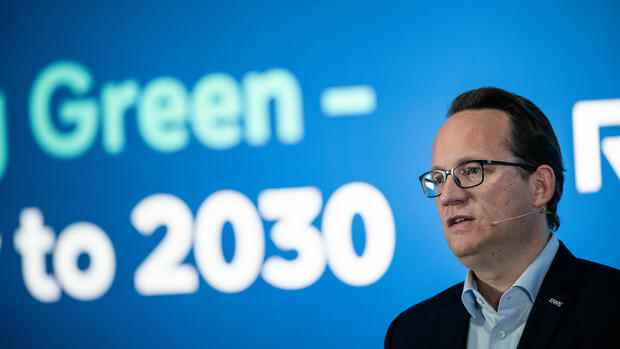Dusseldorf The energy group RWE wants to invest four billion euros in locations in the state of North Rhine-Westphalia by 2030. This sum is intended to create, among other things, capacities for green hydrogen with a capacity of 700 megawatts, two gigawatts in the form of hydrogen-capable gas power plants and one gigawatt of renewable energies.
“As an industrial state, North Rhine-Westphalia plays an outstanding role in the conversion to a climate-neutral economy,” said CEO Markus Krebber on Wednesday. That is why the state is being made a focus of the new strategy.
The RWE boss means the investment offensive announced in November by the Essen-based energy group. A total of 50 billion euros are to flow into the new, more climate-friendly core business. An average of five billion euros are to be invested per year, primarily in wind, sun, storage and hydrogen. The rest is accounted for by the gas business and energy trading. By 2030, RWE wants to expand its green capacities from the current 25 to 50 gigawatts. That is almost as much as the current onshore wind power capacities in all of Germany.
In addition to wind farms and solar parks, RWE now also wants to build new gas-fired power plants with a capacity of two gigawatts in the Rhenish Revier – where there are currently coal-fired power plants. The plants could then be converted to hydrogen. However, this requires clarity as to how hydrogen can get to the sites from the mid-2030s, emphasized RWE.
Top jobs of the day
Find the best jobs now and
be notified by email.
As the largest industrial location in Germany, North Rhine-Westphalia will also be one of the largest buyers of hydrogen in the future. According to calculations by the Jülich research center, NRW will need a total of 104 terawatt hours (TWh) of hydrogen per year in 2050. Almost half of this can be traced back to industry and companies such as BASF, Bayer, Covestro and Thyssen-Krupp.
>> Read here: Savior or illusion? The potential of hydrogen in a fact check
However, the experts assume that almost 90 percent of the hydrogen will have to be imported from abroad. That is why the most populous federal state has already agreed a partnership with the Netherlands to ensure the supply of the energy source.
There was not only applause for this. According to the State Association for Renewable Energies (LEE) NRW, the domestic production of hydrogen is neglected. Imports also harbor the risk that exporting countries will neglect their own energy transition and continue to fuel climate change with coal, oil and gas.
“North Rhine-Westphalia is a strong industrial country, and we want to remain so,” emphasized NRW Economics Minister Andreas Pinkwart (FDP) on Wednesday. That is why work is being done both on accelerating the expansion of renewable energies and on the construction of new gas-fired power plants that can be converted to hydrogen – and the corresponding infrastructure.
Cooperation of the billion dollar corporations RWE and Shell
The largest existing hydrogen network is already in the Rhine-Ruhr area, operated by the industrial group Air Liquide. It runs from Castrop-Rauxel via Marl to Leverkusen. The network has a total length of 240 kilometers. Around 100 kilometers are to be added by 2025, the first large-scale hydrogen-powered plants are to go into operation and 400 trucks with fuel cells and 500 hydrogen buses will be rolling on the roads.
An oil giant could play an important role in the implementation. The billion-dollar corporations RWE and Shell want to work closely together to build up the hydrogen business. The aim is to identify project options and develop them up to investment decisions. This applies to the production, transport and use of green hydrogen. Concrete announcements could follow in the coming weeks, as the Handelsblatt learned from well-informed circles.
RWE and Shell are already working together on the GetH2 mega-hydrogen project in the Netherlands. According to the information provided, the energy group and the British oil giant now want to develop green hydrogen solutions for industrial customers based on the Shell Energy & Chemicals Park Rheinland in Germany, on the Shell sites in Rotterdam and Moerdijk in the Netherlands and on customers in their immediate vicinity focus.
They also intend to look for possible uses of green hydrogen in the mobility sector in Germany, the Netherlands and Great Britain. The starting point for this could be the hydrogen filling station network for heavy trucks that Shell wants to set up between Rotterdam, Cologne and Hamburg by 2024. Here, too, concrete announcements are still pending.
In order to be able to meet the future high demand for the climate-neutral molecule, more and more companies are joining forces to get the hydrogen economy going. Whether Shell, Mitsubishi and Vattenfall, Siemens Energy and Air Liquide or Uniper and Shell – the announcements of large partnerships in the field of hydrogen are increasing.
More: Europe’s battle for gas – Russia still has the upper hand.
